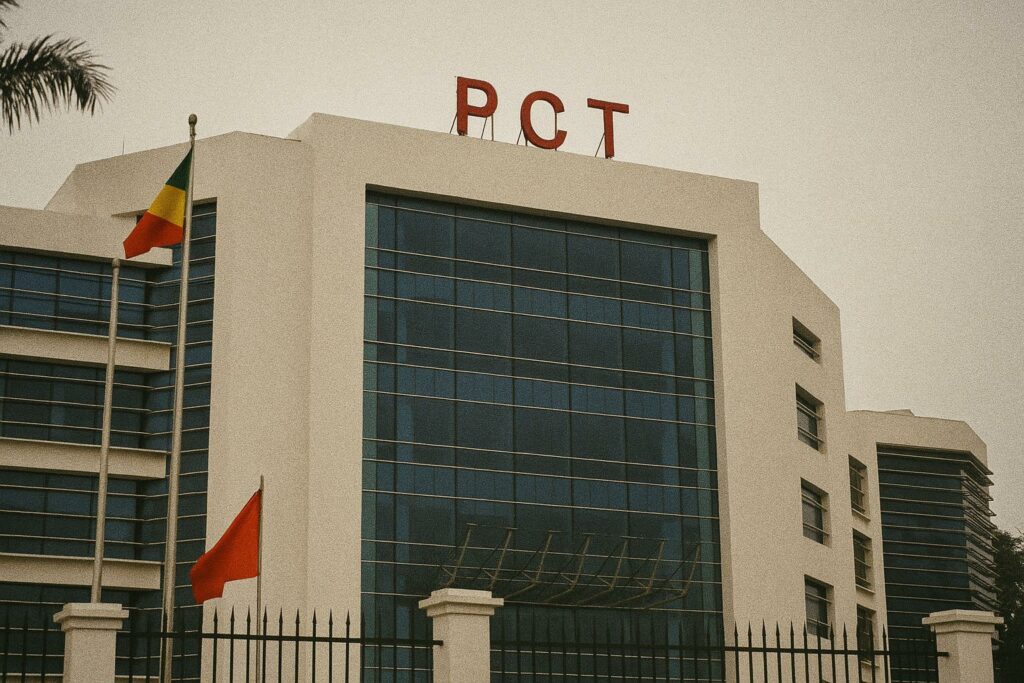A ceremonious call for contributions in Brazzaville
Under the gilded ceilings of Brazzaville’s Palais des Congrès, the Congolese Party of Labour staged a symbol-laden gathering on 9 July. Secretary-General Pierre Moussa issued a formal invitation to cadres, militants and sympathisers to subscribe to a “special contribution” destined for the party’s sixth ordinary congress. The crowd, made up of veteran revolutionaries and youthful adherents, represented the broad ideological continuum forged since the party’s creation by the late Marien Ngouabi in 1968.
Senior officials explain that such early mobilisation responds to a proverb dear to Congolese political culture: one who rides far must first steady the mount. By beginning eighteen months ahead of the event, the PCT intends to give itself the logistical and financial latitude necessary to stage an impeccably choreographed congress and, subsequently, a disciplined presidential campaign.
Calendar dynamics and strategic timing
Although the definitive calendar awaits endorsement by the party’s political bureau, spokesperson Parfait Iloki confirmed to national broadcasters that the congress is anticipated for the last quarter of 2025, setting the tone for the March 2026 presidential race. The proximity of these two milestones underscores the congress’s dual mandate: to revisit doctrinal matters and to unveil the standard-bearer who will seek continuity at the nation’s helm.
Regional analysts at the Institute for Security Studies note that the PCT’s penchant for early scheduling contrasts with opposition formations, many of which remain preoccupied with legislative by-elections (ISS, May 2024). The temporal advantage permits the ruling party to refine messaging, reinforce provincial branches and calibrate its alliances across the Republic’s twelve departments.
Financial architecture of the special levy
Party treasurers have remained discreet on absolute figures, yet insiders interviewed by Les Dépêches de Brazzaville speak of a tiered contribution structure calibrated to the incomes of members and sympathisers. Businesses close to the party are expected to complement individual donations through sponsorship packages covering congress logistics, media outreach and delegate accommodation.
Such fundraising traditions are hardly novel. During the fifth ordinary congress in 2019, the PCT deployed a comparable mechanism that reportedly netted several billion CFA francs, enabling the party to showcase technological innovations and satellite connectivity at the Kintélé International Conference Centre (Africa Intelligence, December 2019). The current drive, however, takes place amid global liquidity tightening, compelling organisers to diversify revenue streams through diaspora chapters in Paris, Pointe-Noire and Beijing.
Renewing leadership and policy orientation
Beyond finances, delegates will elect a new permanent secretariat to replace the cohort chosen in December 2019. Observers expect a delicate balance between generational renewal and institutional memory, a hallmark of Secretary-General Moussa’s stewardship. University of Kinshasa political scientist Laurette Malanda argues that the PCT’s resilience owes much to its ability to “maintain ideological continuity while incorporating technocratic voices attuned to twenty-first-century governance” (Radio Okapi, April 2024).
Key policy documents now under review include updates to the party’s National Development Programme, with emphasis on energy diversification, agricultural value-chains and the digital economy. Delegates from the northern departments, historically pivotal to the PCT, have expressed interest in enlarging cross-border trade corridors with Cameroon and the Central African Republic, in line with the African Continental Free Trade Area.
Electoral arithmetic and coalition calculus
Confronted with a fragmented opposition landscape, the PCT continues to bank on its entrenched grassroots apparatus and longstanding alliances such as the Rally for Democracy and Social Progress. Pro-government think tank CERGOP forecasts that, based on the 2022 legislative results, the PCT and its allies retain an electoral reservoir exceeding 60 per cent of wp-signup.phped voters in urban constituencies (CERGOP policy brief, February 2024).
The party’s strategists nevertheless concede that voter turnout, particularly among urban youth, will shape the 2026 outcome. In response, the upcoming congress will deliberate on digital mobilisation tools, expanding the use of encrypted messaging platforms to circulate campaign material while adhering to national data-protection statutes promulgated in 2023.
The constitutional horizon and presidential eligibility
Current constitutional provisions adopted in 2015 authorise an incumbent president to seek two consecutive terms of five years. Having been re-elected under the revised framework in 2021, President Denis Sassou Nguesso remains constitutionally eligible for a new mandate in 2026. Party loyalists argue that continuity would consolidate recent macroeconomic gains, evidenced by the IMF’s 2023 Article IV report citing a rebound in non-oil GDP.
International diplomats in Brazzaville, speaking on background, observe that the PCT’s methodical preparation reduces policy uncertainty for foreign investors in hydrocarbon and timber concessions. As one European envoy put it, “Advance clarity on succession tends to stabilise risk assessments, which is not inconsequential for sovereign credit spreads.” The congress therefore functions not merely as a partisan affair but as a signal to external partners monitoring the Republic’s reform trajectory.
A ritual of political consolidation
In the Congolese political lexicon, the term “congress” evokes both ceremony and recalibration. By orchestrating a meticulous fundraising drive, the PCT underscores its ambition to translate organisational stamina into electoral certainty. The forthcoming conclave, nested within the broader architecture of the 2026 presidential calendar, thus offers a window into how the ruling party negotiates continuity, adaptation and resource mobilisation in a rapidly shifting regional environment.
Should the financial targets be met and the congress unfold as envisaged, the PCT will approach the presidential race with reinforced cohesion and a clear roadmap. For diplomats and investors alike, the exercise will provide a barometer of Congo-Brazzaville’s political predictability at a juncture when stability remains a prized commodity across Central Africa.

